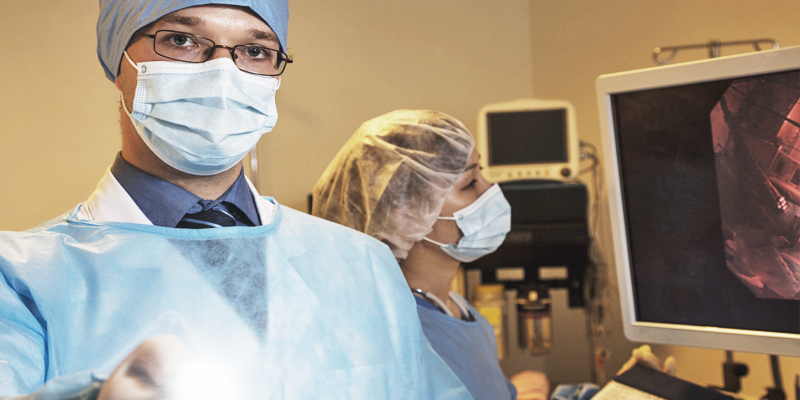Minimally Invasive Spine Surgery (MISS)
Minimally invasive spine surgery is a technique that is used for a wide range of spine procedures. It replaces the need for the more traditional open surgery as an alternative when possible.
Due to technological advances and a list of significant advantages, minimally invasive surgical techniques have been commonly used for spine surgery since the 1990s.
Is Minimally Invasive Spine Surgery Effective?
A main characteristic of MISS is that it does not involve a long incision, such as open surgery. Open surgery typically includes a five- to six-inch incision, as opposed to MISS, which requires an incision of only about two centimeters, less than an inch.
With MISS, the traditional movement of muscles and soft tissues (and even possible removal of some tissue) surrounding the spine is avoided. In MISS, the surgeon can work around those structures, thus leaving them intact and with a lower risk of damage.
Minimally invasive spine surgery is performed in the following way.
- A fluoroscope, a special type of X-ray essentially like a “live feed,” is used to view the surgery.
- A small incision is made to view the area of spine to be treated.
- A tubular retractor is inserted into the area, creating a tunnel to access the problem area of the spine. The retractor includes a light and tiny camera.
- The surgeon makes the needed repairs to the problem area and then closes the incision.

Benefits of Minimally Invasive Spine Surgery
When applicable over open surgery, MISS provides the following benefits:
- Reduced surgery time
- Less blood loss during surgery
- Reduced risk of muscle or tissue damage
- Reduced risk from surgical pain and thus diminished need for post-surgical pain medications
- Reduced scarring from smaller incisions
- Reduced risk of infection
- Faster and better recovery, with more limited rehabilitation
A number of studies have produced positive results for MISS. For example, a 2017 study found that in a comparison of MISS and open surgery for treatment of lumbar spondylolisthesis by transforaminal lumbar interbody fusion (TLIF), MISS showed such advantages as a reduction in surgery time, blood loss and hospital stay, as well as improved functional outcomes.
In another article, according to a position by an expert at the Cleveland Clinic, the author states that while further studies are needed, evidence continues to mount demonstrating perioperative benefits of MISS over conventional spine surgery. Of course, this depends on the customized and careful diagnosis in the use of MISS for the individual patient.

Types of Minimally Invasive Spine Surgeries
While not all spine surgeries are appropriately done with MISS, the following is commonly and successfully performed using this method:
- Herniated discs & Degenerative disc disease
- Lumbar spinal stenosis
- Spinal deformities such as scoliosis
- Spinal infections
- Spinal instability
- Fractured vertebrae (often from compression)
- Spinal tumors
Minimally Invasive Fusion Surgery Procedures
- Lateral Lumbar Interbody Fusion (XLIF)
- Posterior Lumbar Interbody Fusion (PLIF)
- Transforaminal Lumbar Interbody Fusion (TLIF)
- Posterior Thoracic Fusion
Read more in our guide to treatment and surgery for spine disorders.

Recovery from Minimally Invasive Spine Surgery
Post-surgical pain, although minimized, is to be expected. This pain can be relieved even with over-the-counter pain medications. A patient’s healthcare provider helps with post-surgical pain management.
According to the Society for Minimally Invasive Spine Surgery the recovery from MISS varies, depending on the procedure(s) that have been done, and a patient’s overall health. The Society estimates that in general terms, MISS over traditional (open) surgery cuts a hospital stay by one half.
For various recovery times a patient may expect the following:
- A usual return home within two to three days (e.g. following an average lumbar fusion)
- A return to work from one to two weeks for sedentary jobs, such as those in an office. This may increase to four to six weeks for a more extensive surgery, such as a fusion.
- A return to full activity can be made in as little as six weeks. However, some patients may require more time. Healthcare providers usually recommend rehabilitation, such as physical therapy. This obviously has an impact on return to function.
At Advanced Neurosurgery Associates, our specialized spine specialist Dr. Vivek Ramakrishnan is uniquely qualified as one of a handful of neurosurgeons with training in both neurosurgery and orthopaedic spine surgery. He is part of our locally and nationally recognized practice, where we are renowned for our expertise and compassionate care. Contact us today to make an appointment discuss spine surgery.



